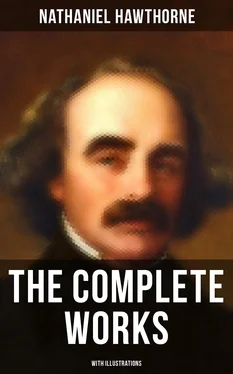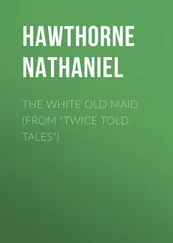“But I offer my edifice as a spectacle to the world,” said Hollingsworth, “that it may take example and build many another like it. Therefore, I mean to set it on the open hillside.”
Twist these words how I might, they offered no very satisfactory import. It seemed hardly probable that Hollingsworth should care about educating the public taste in the department of cottage architecture, desirable as such improvement certainly was.
Table of Contents
Hollingsworth and I — we had been hoeing potatoes, that forenoon, while the rest of the fraternity were engaged in a distant quarter of the farm — sat under a clump of maples, eating our eleven o’clock lunch, when we saw a stranger approaching along the edge of the field. He had admitted himself from the roadside through a turnstile, and seemed to have a purpose of speaking with us.
And, by the bye, we were favored with many visits at Blithedale, especially from people who sympathized with our theories, and perhaps held themselves ready to unite in our actual experiment as soon as there should appear a reliable promise of its success. It was rather ludicrous, indeed (to me, at least, whose enthusiasm had insensibly been exhaled together with the perspiration of many a hard day’s toil), it was absolutely funny, therefore, to observe what a glory was shed about our life and labors, in the imaginations of these longing proselytes. In their view, we were as poetical as Arcadians, besides being as practical as the hardest-fisted husbandmen in Massachusetts. We did not, it is true, spend much time in piping to our sheep, or warbling our innocent loves to the sisterhood. But they gave us credit for imbuing the ordinary rustic occupations with a kind of religious poetry, insomuch that our very cow-yards and pigsties were as delightfully fragrant as a flower garden. Nothing used to please me more than to see one of these lay enthusiasts snatch up a hoe, as they were very prone to do, and set to work with a vigor that perhaps carried him through about a dozen ill-directed strokes. Men are wonderfully soon satisfied, in this day of shameful bodily enervation, when, from one end of life to the other, such multitudes never taste the sweet weariness that follows accustomed toil. I seldom saw the new enthusiasm that did not grow as flimsy and flaccid as the proselyte’s moistened shirt-collar, with a quarter of an hour’s active labor under a July sun.
But the person now at hand had not at all the air of one of these amiable visionaries. He was an elderly man, dressed rather shabbily, yet decently enough, in a gray frock-coat, faded towards a brown hue, and wore a broad-brimmed white hat, of the fashion of several years gone by. His hair was perfect silver, without a dark thread in the whole of it; his nose, though it had a scarlet tip, by no means indicated the jollity of which a red nose is the generally admitted symbol. He was a subdued, undemonstrative old man, who would doubtless drink a glass of liquor, now and then, and probably more than was good for him, — not, however, with a purpose of undue exhilaration, but in the hope of bringing his spirits up to the ordinary level of the world’s cheerfulness. Drawing nearer, there was a shy look about him, as if he were ashamed of his poverty, or, at any rate, for some reason or other, would rather have us glance at him sidelong than take a full front view. He had a queer appearance of hiding himself behind the patch on his left eye.
“I know this old gentleman,” said I to Hollingsworth, as we sat observing him; “that is, I have met him a hundred times in town, and have often amused my fancy with wondering what he was before he came to be what he is. He haunts restaurants and such places, and has an odd way of lurking in corners or getting behind a door whenever practicable, and holding out his hand with some little article in it which he wishes you to buy. The eye of the world seems to trouble him, although he necessarily lives so much in it. I never expected to see him in an open field.”
“Have you learned anything of his history?” asked Hollingsworth.
“Not a circumstance,” I answered; “but there must be something curious in it. I take him to be a harmless sort of a person, and a tolerably honest one; but his manners, being so furtive, remind me of those of a rat, — a rat without the mischief, the fierce eye, the teeth to bite with, or the desire to bite. See, now! He means to skulk along that fringe of bushes, and approach us on the other side of our clump of maples.”
We soon heard the old man’s velvet tread on the grass, indicating that he had arrived within a few feet of where we Sat.
“Good-morning, Mr. Moodie,” said Hollingsworth, addressing the stranger as an acquaintance; “you must have had a hot and tiresome walk from the city. Sit down, and take a morsel of our bread and cheese.”
The visitor made a grateful little murmur of acquiescence, and sat down in a spot somewhat removed; so that, glancing round, I could see his gray pantaloons and dusty shoes, while his upper part was mostly hidden behind the shrubbery. Nor did he come forth from this retirement during the whole of the interview that followed. We handed him such food as we had, together with a brown jug of molasses and water (would that it had been brandy, or some thing better, for the sake of his chill old heart!), like priests offering dainty sacrifice to an enshrined and invisible idol. I have no idea that he really lacked sustenance; but it was quite touching, nevertheless, to hear him nibbling away at our crusts.
“Mr. Moodie,” said I, “do you remember selling me one of those very pretty little silk purses, of which you seem to have a monopoly in the market? I keep it to this day, I can assure you.”
“Ah, thank you,” said our guest. “Yes, Mr. Coverdale, I used to sell a good many of those little purses.”
He spoke languidly, and only those few words, like a watch with an inelastic spring, that just ticks a moment or two and stops again. He seemed a very forlorn old man. In the wantonness of youth, strength, and comfortable condition, — making my prey of people’s individualities, as my custom was, — I tried to identify my mind with the old fellow’s, and take his view of the world, as if looking through a smoke-blackened glass at the sun. It robbed the landscape of all its life. Those pleasantly swelling slopes of our farm, descending towards the wide meadows, through which sluggishly circled the brimful tide of the Charles, bathing the long sedges on its hither and farther shores; the broad, sunny gleam over the winding water; that peculiar picturesqueness of the scene where capes and headlands put themselves boldly forth upon the perfect level of the meadow, as into a green lake, with inlets between the promontories; the shadowy woodland, with twinkling showers of light falling into its depths; the sultry heat-vapor, which rose everywhere like incense, and in which my soul delighted, as indicating so rich a fervor in the passionate day, and in the earth that was burning with its love, — I beheld all these things as through old Moodie’s eyes. When my eyes are dimmer than they have yet come to be, I will go thither again, and see if I did not catch the tone of his mind aright, and if the cold and lifeless tint of his perceptions be not then repeated in my own.
Yet it was unaccountable to myself, the interest that I felt in him.
“Have you any objection,” said I, “to telling me who made those little purses?”
“Gentlemen have often asked me that,” said Moodie slowly; “but I shake my head, and say little or nothing, and creep out of the way as well as I can. I am a man of few words; and if gentlemen were to be told one thing, they would be very apt, I suppose, to ask me another. But it happens just now, Mr. Coverdale, that you can tell me more about the maker of those little purses than I can tell you.”
Читать дальше












